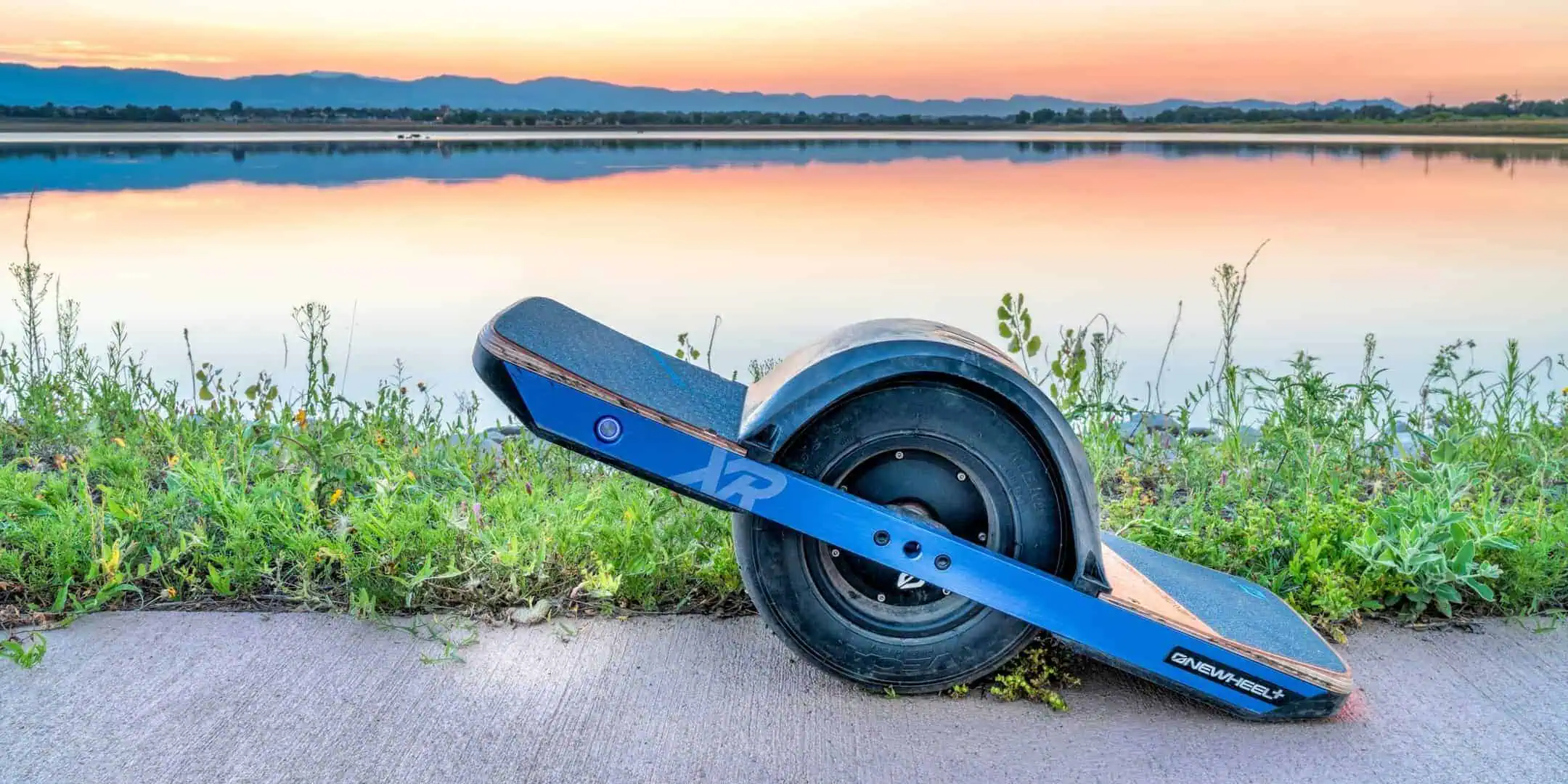Future Motion Onewheel Lawsuit
- Last Updated: July 14th, 2025

Attorney Jessica Paluch-Hoerman, founder of TruLaw, has over 28 years of experience as a personal injury and mass tort attorney, and previously worked as an international tax attorney at Deloitte. Jessie collaborates with attorneys nationwide — enabling her to share reliable, up-to-date legal information with our readers.
Legally Reviewed
This article has been written and reviewed for legal accuracy and clarity by the team of writers and legal experts at TruLaw and is as accurate as possible. This content should not be taken as legal advice from an attorney. If you would like to learn more about our owner and experienced injury lawyer, Jessie Paluch, you can do so here.
Fact-Checked
TruLaw does everything possible to make sure the information in this article is up to date and accurate. If you need specific legal advice about your case, contact us by using the chat on the bottom of this page. This article should not be taken as advice from an attorney.
Key takeaways:
- Future Motion, the manufacturer of Onewheel, is facing lawsuits due to alleged product defects causing injuries.
- The Onewheel device, despite its popularity, has been reported to suddenly stop working, leading to "nosedive" accidents.
- Victims claim that the company failed to warn about the risks and potential dangers of using the Onewheel device.
Overview of the Future Motion Onewheel Skateboard Lawsuit
The Onewheel lawsuit has attracted considerable attention, both from consumers and legal experts.
On this page, we’ll provide an overview of the Onewheel Lawsuit, the legal grounds of the Onewheel Lawsuit, safety concerns and reported incidents involving Onewheel Electric Skateboards, and much more.
Introduction to the Future Motion Onewheel Electric Skateboard Lawsuits
The U.S. Consumer Product Safety Commission (CPSC) has issued a recall for the skateboards, citing reports of injury and death.
As a result of the injuries caused by the defective product, numerous lawsuits have been filed against Future Motion, a California based company headquartered in Santa Cruz.
The CPSC has also advised that consumers immediately stop using the Onewheel electric skateboards.
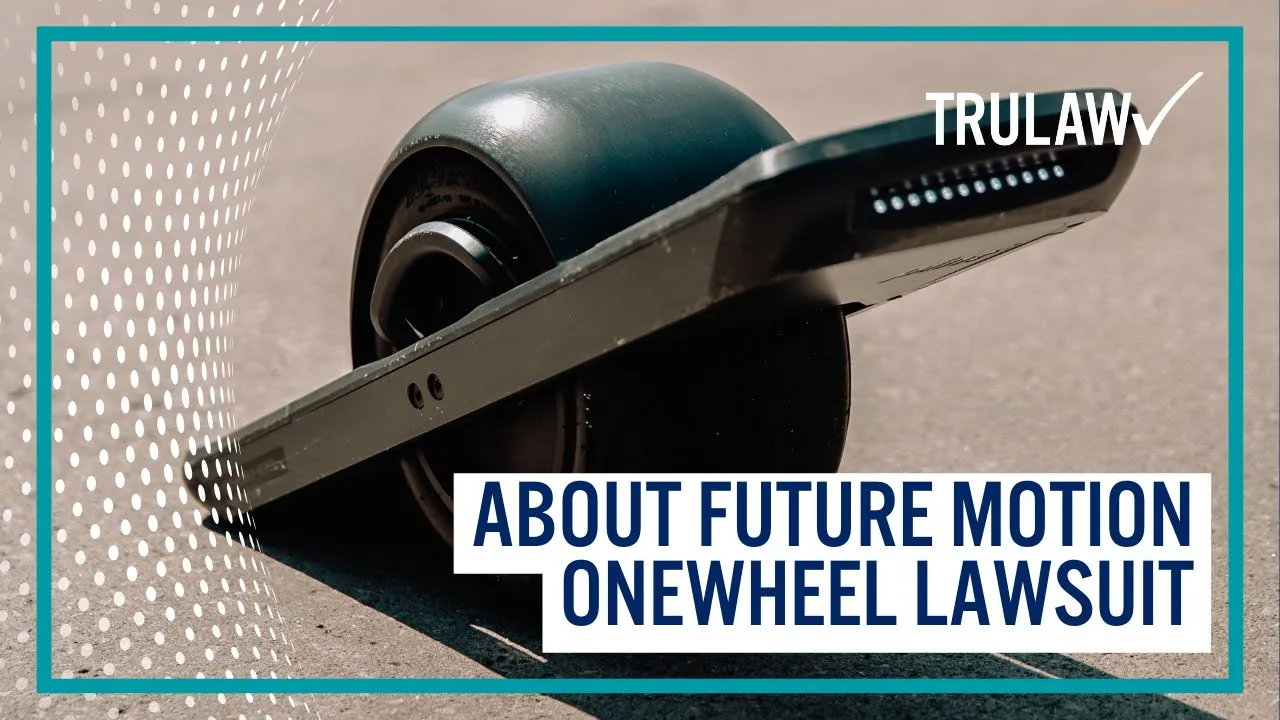
Future Motion is facing legal action and allegations of negligence in prioritizing profits over customer safety.
Reported injuries caused by the Onewheel skateboard include, but are not limited to:
- Concussions;
- Traumatic brain injuries;
- Death;
- Spinal cord injuries;
- Deep lacerations;
- Broken bones; and
- Other serious injuries
Given the product’s popularity and its impact on the electric personal transportation industry, the outcome could have far-reaching implications.
It’s important to recognize that this innovative technology is still in its infancy and sets a precedent for safety standards and regulations in the broader electric personal transportation industry
There has been a voluntary recall of over 300,000 Onewheel electric skateboards. Theses skateboards have been linked to atleast 4 deaths.
You may be eligible to file a Onewheel Lawsuit if you’ve experienced injuries or an accident due to the malfunction of a Onewheel skateboard.
Contact TruLaw to learn more and connect with one of our experienced Onewheel Skateboard Lawyers for a no-obligation consultation.
We’re here to help you seek the compensation you deserve.
Table of Contents
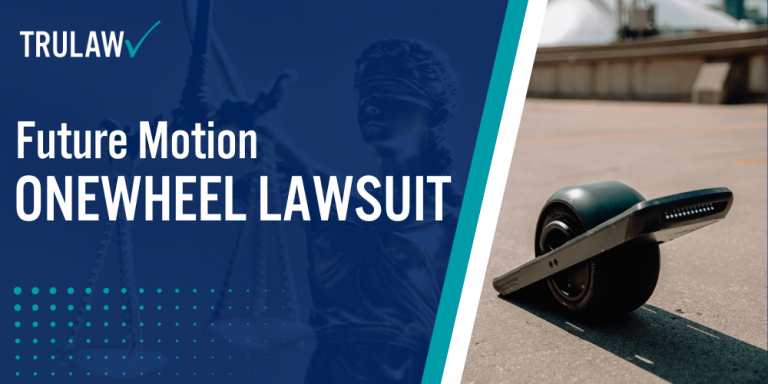
Future Motion and Onewheel Skateboard
Future Motion is the manufacturer of Onewheel, was founded by Kyle Doerksen as a California based company headquartered in Santa Cruz.
Due to recent safety concerns and the recall of all models, the use of Onewheel skateboards is strongly discouraged.
However, recently there have been significant safety concerns regarding Onewheel skateboards, leading to a recall of all models due to crash and ejection hazards.
This recall comes after reports of four deaths and multiple injuries associated with the use of Onewheel skateboards.
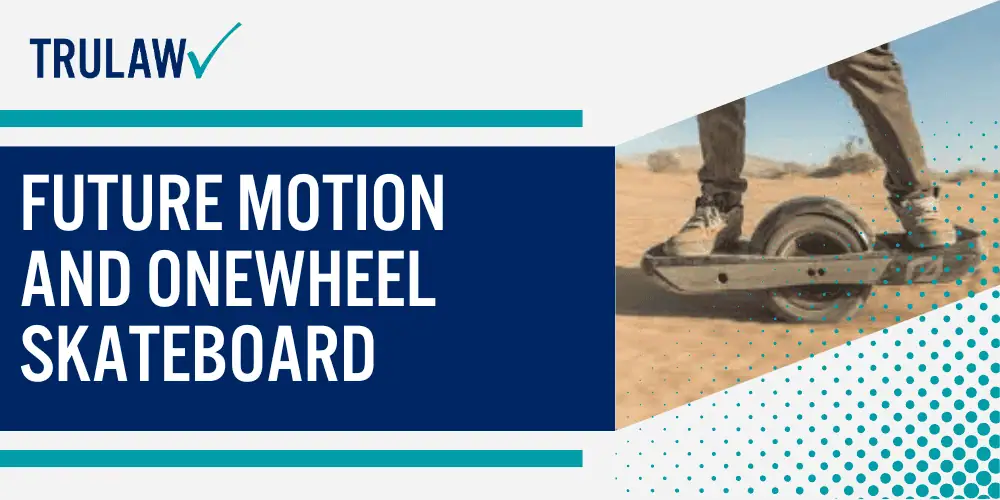
The U.S. Consumer Product Safety Commission (CPSC) has issued warnings and urges consumers to stop using Onewheel skateboards immediately.
Future Motion has been uncooperative in agreeing to an acceptable recall, and CPSC intends to continue pursuing a recall for consumers.
Recall of Onewheel Electric Skateboards
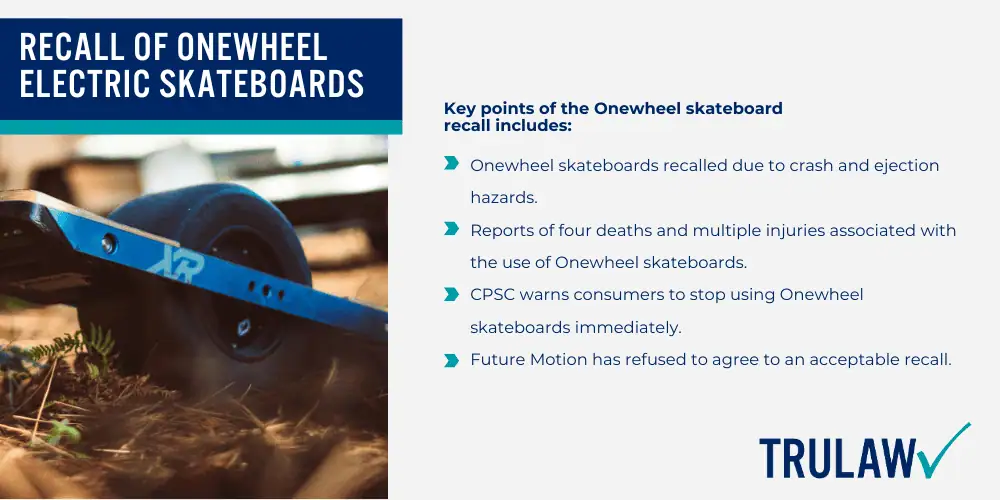
Key points of the Onewheel skateboard recall includes:
- Onewheel skateboards recalled due to crash and ejection hazards.
- Reports of four deaths and multiple injuries associated with the use of Onewheel skateboards.
- CPSC warns consumers to stop using Onewheel skateboards immediately.
- Future Motion has refused to agree to an acceptable recall.
The recall is due to crash and ejection hazards associated with the use of Onewheel skateboards.
Reports of four deaths and multiple injuries have been linked to the use of these skateboards.
The U.S. Consumer Product Safety Commission (CPSC) has warned consumers to stop using Onewheel skateboards immediately.
Future Motion has refused to agree to an acceptable recall, and CPSC is actively pursuing a recall for consumers.
The Onewheel Lawsuit: Future Motion
Lawsuits are being filed against the manufacturer of Onewheel devices due to various reasons.
One of the main concerns is the motor and the device’s “pushback” feature.
There have been reports of defects related to the motor, which can cause sudden stops or malfunctions, leading to accidents and injuries.
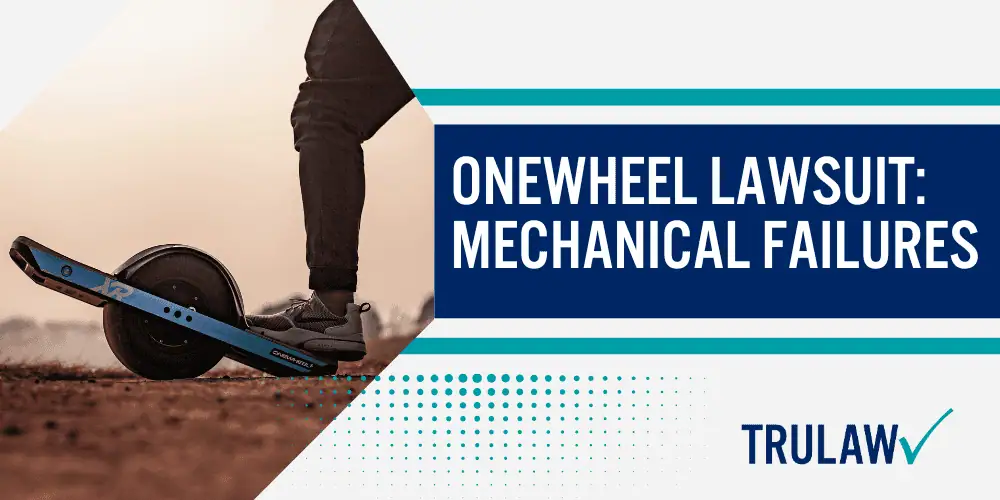
Additionally, the “pushback” feature, which is supposed to provide a warning to riders when they are approaching the device’s limits, has been questioned for its effectiveness and reliability.
Riders have experienced unexpected nosedives, resulting in severe injuries.
Nature of Claims Against Future Motion
The claims put forth by the plaintiffs encompass a spectrum of allegations, each shedding light on the grievances they hold against Future Motion.
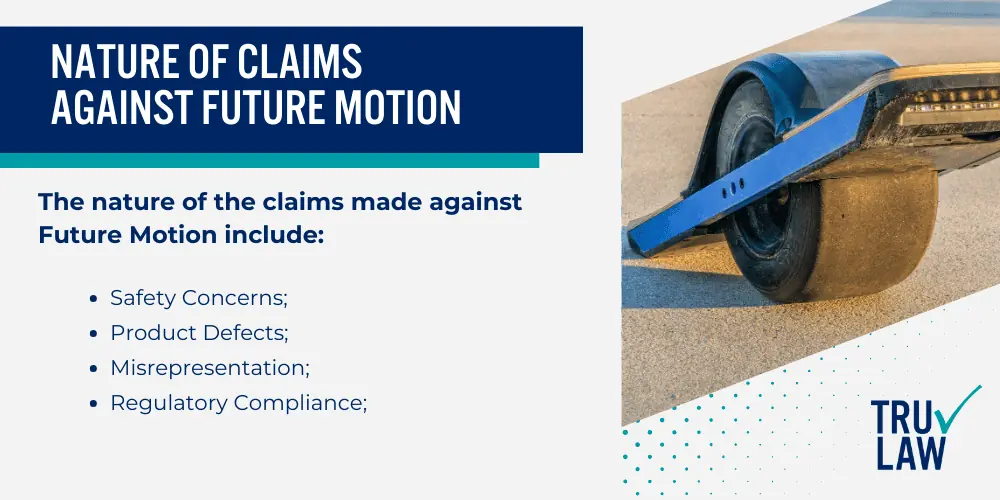
These claims may include, but are not limited to:
- Safety Concerns: Some plaintiffs may contend that Onewheel devices have inherent design or manufacturing flaws that render them unsafe for use, leading to accidents and injuries.
- Product Defects: Claims revolving around alleged defects, such as issues with the self-balancing technology, low battery malfunctions, or mechanical failures, may be at the core of the lawsuit.
- Misrepresentation: Allegations of misrepresentation by Future Motion might center on claims that the company provided inaccurate information regarding the capabilities or safety features of Onewheel devices, potentially misleading consumers.
- Regulatory Compliance: Some plaintiffs may allege that Future Motion failed to adhere to relevant safety regulations or industry standards, which they believe should have been upheld.
Contact TruLaw to learn more and connect with one of our experienced Onewheel Skateboard Lawyers for a no-obligation consultation.
It is important to note that if you or a loved one have been injured while using a Onewheel skateboard, you may be eligible to file a lawsuit against the manufacturer.
The Legal Grounds of the Onewheel Lawsuit
Onewheel Lawsuit: Laws & Regulations Cited
The Onewheel lawsuit draws upon various laws, regulations, and legal principles as the foundation for the claims presented by the plaintiffs.
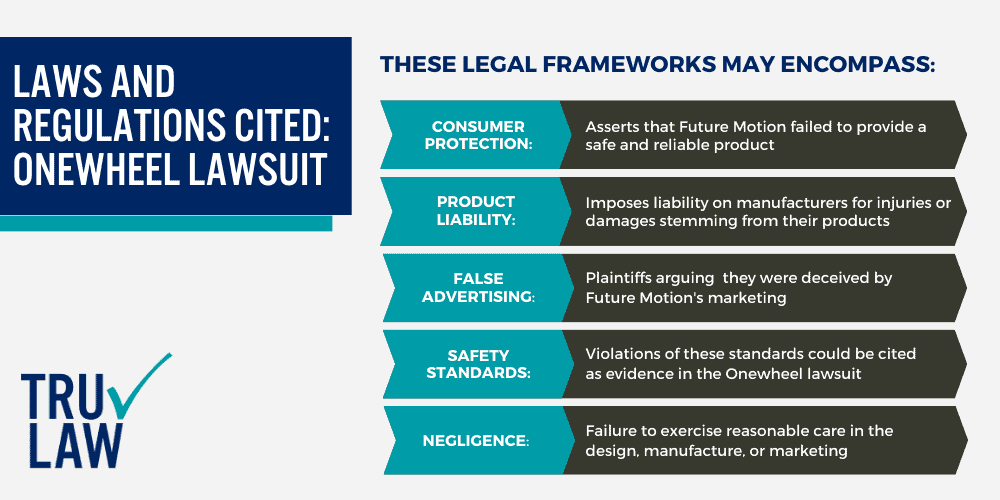
These legal frameworks may encompass:
- Consumer Protection Laws: Plaintiffs may invoke consumer protection laws to assert that Future Motion breached consumer rights by failing to provide a safe and reliable product.
- Product Liability Laws: Claims related to product defects or design deficiencies may be rooted in product liability laws, which impose liability on manufacturers for injuries or damages stemming from their products. This can lead to product liability lawsuits.
- False Advertising Laws: In cases of alleged misrepresentation or false advertising, laws governing deceptive trade practices may come into play, with plaintiffs arguing that they were deceived by Future Motion’s marketing.
- Safety Standards and Regulations: If Onewheel devices are subject to specific safety standards or regulations, any violations of these standards could be cited as evidence in the lawsuit.
- Negligence: Allegations of negligence on the part of Future Motion may underpin certain claims, positing that the company failed to exercise reasonable care in the design, manufacture, or marketing of Onewheel products.
The specific legal grounds cited in the lawsuit will be meticulously detailed within the official legal documents, which can be accessed through official court records and legal reference guides.
For a comprehensive grasp of the lawsuit, referring to the official court documents and legal reference guides is recommended.
Onewheel Lawsuit: Safety Concerns
Reported Incidents of the Onewheel Lawsuit
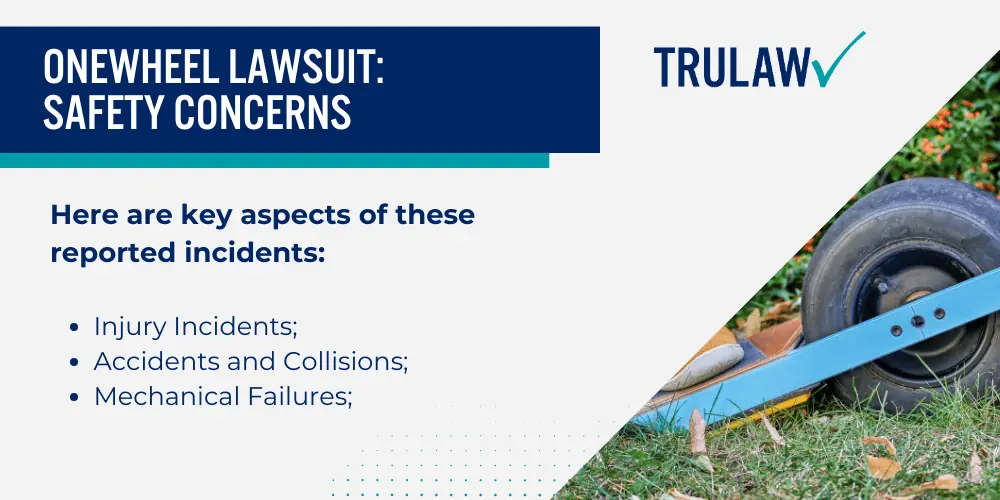
Here are key aspects of these reported incidents:
- Injury Incidents
- Accidents and Collisions
- Mechanical Failures
Numerous incidents have been reported involving riders of Onewheel devices suffering injuries.
The multiple injuries reported encompass a spectrum, ranging from minor scrapes and bruises to more severe injuries.
These serious injuries include, but are not limited to:
- Bone Fractures;
- Concussions;
- Death;
- Other head trauma;
- Wrongful death; and
- Other injuries
These physical injuries are often the result of accidents or falls while using the Onewheel or when the Onewheel suddenly stopped.
Accidents and Collisions
Some reported cases involve Onewheel riders being involved in accidents or collisions.
These incidents not only pose risks to the riders themselves but can also result in injuries to other individuals, such as pedestrians or occupants of other vehicles.
If you are an individual who has been involved in a collision with a Onewheel rider, we may be able to file a claim if you have suffered injuries as a result.
Mechanical Failures
Onewheel skateboards have faced lawsuits due to mechanical failures, including battery malfunctions, motor issues, and wheel and tire problems.
These failures have resulted in injuries and have been linked to at least 4 deaths, leading riders to take legal action against the manufacturer.
Attention from Regulatory Bodies
Onewheel devices have garnered the attention of regulatory bodies, reflecting the growing importance of ensuring the safety of personal electric transportation devices.
Regulatory scrutiny can have substantial implications for both the industry and consumers.
Here is an overview of the attention received from the following regulatory bodies:
- Federal Regulatory Agencies
- Consumer Product Safety Commission (CPSC)
- State and Local Authorities
Federal Regulatory Agencies
These investigations can involve the collection of data, examinations, and the issuance of statements or recommendations based on their findings.
The NHTSA, in particular, plays a pivotal role in overseeing the safety of motor vehicles and related technologies.
Consumer Product Safety Commission (CPSC)
The CPSC evaluated Onewheel products and found that they can cause the rider to be ejected, leading to serious injuries.
At least four deaths and multiple injuries have been reported.
The CPSC issued a warning advising consumers to immediately stop using Onewheel self-balancing electric skateboards.
Some examples of warnings issued by the CPSC in regard to the Onewheel recall include:
- Future Motion Recalls Onewheel Self-Balancing Electric Skateboards Due to Crash Hazard; Four Deaths Reported
- CPSC Warns Consumers to Stop Using Onewheel Self-Balancing Electric Skateboards Due to Ejection Hazard; At Least Four Deaths and Multiple Injuries Reported
- CPSC.gov – Future Motion Refuses to Recall Deadly Onewheel Skateboard
The CPSC is a key regulatory agency responsible for monitoring and addressing product safety concerns.
If safety-related issues regarding Onewheel devices are reported to the CPSC, the agency may continue to undertake investigations to assess potential risks to consumers.
State and Local Authorities
State and local authorities are actively collaborating with federal agencies like the CPSC in the recall of 300,000 Onewheel electric skateboards.
This multi-level governmental cooperation ensures that the recall is effectively communicated and executed at the community level, enhancing public safety.
By working in tandem with the CPSC, state and local agencies are better equipped to monitor compliance, disseminate information, and take necessary actions to remove unsafe Onewheel products from the market
Safety Gear: Onewheel GT Electric Skateboard, Onewheel XR, and Onewheel Pint
Recent reports indicate that the U.S. Consumer Product Safety Commission (CPSC) has issued warnings about the significant risks associated with the Onewheel GT and Onewheel XR models.
The CPSC has cited risks of wrongful death and serious injury and has urged consumers to stop using these devices.
Onewheel Lawsuit: Mechanical Failures
Onewheel skateboards have faced several lawsuits due to mechanical failures.
These failures have resulted in accidents and injuries, leading to legal action against the company.
Mechanical Failures Leading to the Onewheel Lawsuit
The mechanical failures leading to the Onewheel Lawsuit include but are not limited to:
- Battery Malfunctions: Some Onewheel skateboards have experienced battery malfunctions, causing sudden power loss or overheating.
- Motor Issues: There have been cases where the motor of Onewheel skateboards has malfunctioned, causing sudden stops or uncontrollable acceleration.
- Wheel and Tire Problems: Issues such as tire blowouts, wheel lock-ups, or wheel detachment have caused accidents and injuries, resulting in legal claims against the company.
Battery Malfunctions
Battery malfunctions in Onewheel skateboards have been a significant concern for riders.
These malfunctions can lead to sudden power loss or overheating, posing a safety risk.
Key points regarding the Onewheel electric skateboard’s battery malfunctions are:
- Onewheel skateboards use lithium-ion batteries, which can be prone to malfunctions if not properly maintained or if there are manufacturing defects.
- Battery malfunctions can cause the skateboard to shut down unexpectedly, leading to accidents and injuries.
- Overheating batteries can pose a fire hazard, increasing the risk of property damage and fatal injuries.
Motor Issues
Malfunctioning motors in Onewheel skateboards have been reported by riders, resulting in accidents and injuries.
Important details about Onewheel motor issues include, but are not limited to:
- Motor malfunctions can cause sudden stops or uncontrollable acceleration, leading to accidents and injuries.
- These issues can be attributed to manufacturing defects, improper maintenance, or wear and tear.
- Riders have experienced loss of control when the motor malfunctions, increasing the risk of accidents and injuries.
Wheel and Tire Problems
Wheel and tire problems have also been a cause for concern in Onewheel skateboards, leading to lawsuits.
Some key points regarding the wheel and tire problems mentioned in the Onewheel lawsuit include, but are not limited to:
- Tire blowouts, wheel lock-ups, or wheel detachment can occur due to manufacturing defects or improper maintenance.
- These problems can cause riders to lose control of the skateboard, resulting in fatal accidents and injuries.
- Wheel and tire issues can be particularly dangerous when riding at high speeds or on uneven terrain
These failures have resulted in injuries and have been linked to at least 4 deaths, leading riders to take legal action against the manufacturer.
If you or a loved one has experienced injuries due to a mechanical failure while riding a Onewheel electric skateboard, then you may be eligible to file a lawsuit against the manufacturer.
Contact TruLaw to learn more and connect with an experienced Onewheel lawsuit lawyer today.
Investigating Legal Precedents: Future Motion
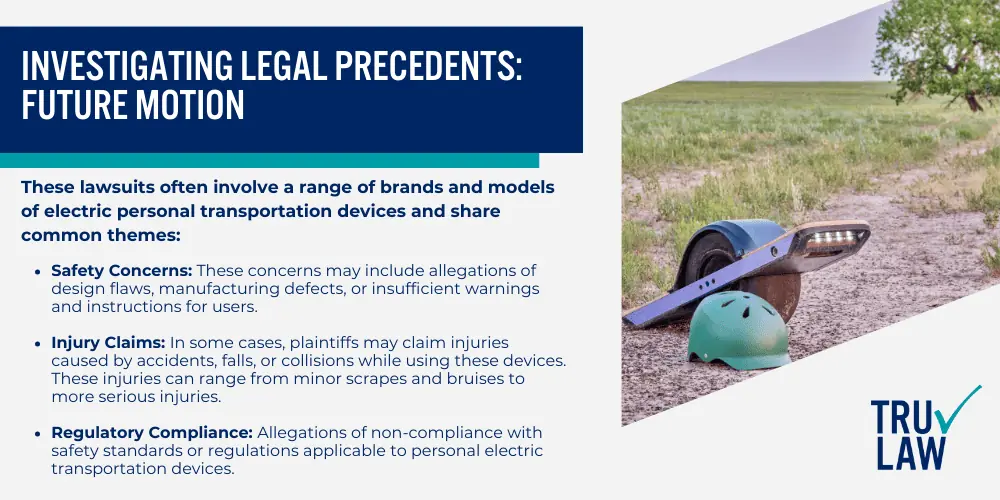
Other Lawsuits Involving Personal Electric Transportation Devices
There have also been class action lawsuits filed against e-scooter companies for practices that have contributed to injuries.
In a lawsuit filed in Los Angeles County Superior Court, Bird and Lime, along with other e-scooter companies, were accused of negligence and failure to warn riders about the potential dangers of their scooters
These lawsuits often involve a range of brands and models of electric personal transportation devices and share common themes.
The common themes observed in the electric personal transportation industry include, but are not limited to:
- Safety Concerns: Many lawsuits related to personal electric transportation devices focus on safety concerns. These concerns may include allegations of design flaws, manufacturing defects, or insufficient warnings and instructions for users.
- Injury Claims: In some cases, plaintiffs may claim injuries caused by accidents, falls, or collisions while using these devices. These injuries can range from minor scrapes and bruises to more serious injuries, prompting legal action against manufacturers.
- Regulatory Compliance: Lawsuits may also revolve around allegations of non-compliance with safety standards or regulations applicable to personal electric transportation devices. Such regulations may be imposed by federal, state, or local authorities.
Setting a Precedent for Future Cases
The lawsuits involving Future Motion and Onewheel devices carry implications that extend beyond the immediate legal proceedings.
They have the potential to set a precedent for how similar cases are approached in the future within the personal electric transportation industry.
Here are some key implications in the Onewheel Lawsuit:
- Legal Standards
- Consumer Awareness
- Regulatory Response
- Industry Practices
- Risk Mitigation
Legal Standards
The outcomes of these lawsuits can influence legal standards and expectations concerning the safety, design, and marketing of personal electric transportation devices.
A significant judgment or settlement may prompt manufacturers to reevaluate their product development and safety measures.
Consumer Awareness
Public attention to these lawsuits can raise consumer awareness regarding the safety of personal electric transportation devices.
Consumers may become more diligent in assessing the safety features and reliability of such products before making a purchase.
Regulatory Response
Regulatory bodies may take cues from the legal outcomes to adjust safety regulations and standards.
If regulatory authorities perceive a need for enhanced oversight, they may enact stricter regulations governing manufacturers in the industry.
Industry Practices
Manufacturers within the personal electric transportation industry may revise their practices in response to legal precedents and consumer expectations.
This could involve strengthening product safety measures, revising marketing strategies, or investing in legal compliance programs.
Risk Mitigation
Companies operating in the industry may intensify their efforts to mitigate legal risks.
This could encompass a range of actions, including bolstering product safety protocols, revising user guidelines, and investing in comprehensive legal compliance measures.
Industry stakeholders, including manufacturers, regulators, and consumers, should closely monitor the developments of these lawsuits and their potential ramifications.
Accessing external industry analysis resources can provide valuable insights into how legal precedents may shape the future landscape of the personal electric transportation industry.
For a comprehensive understanding of similar cases and their implications, referring to external legal precedent databases and industry analysis reports is recommended.
Onewheel Lawsuit: Regulatory Landscape
Given the rapid growth in the popularity of electric personal transportation devices and mounting concerns about safety, the prospect of new legislation aimed at enhancing safety standards and regulatory clarity within the industry is increasingly likely.
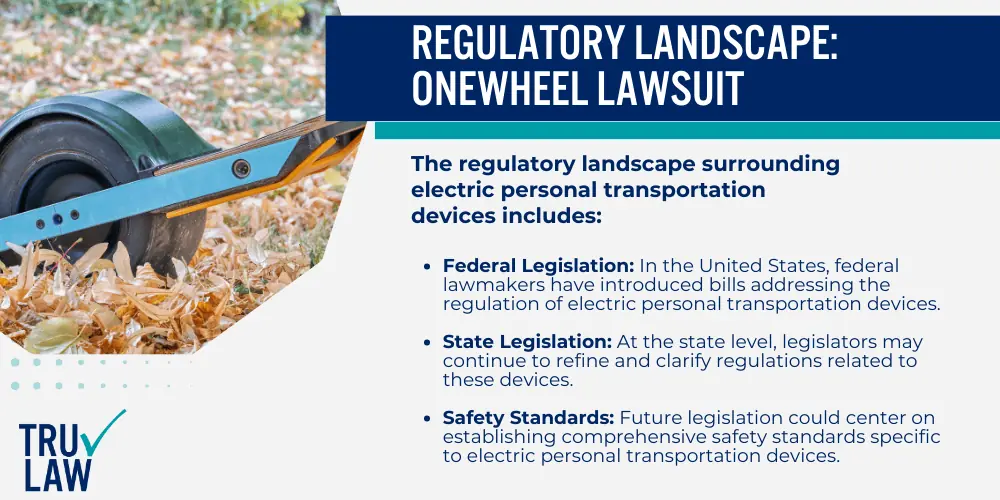
The regulatory landscape surrounding electric personal transportation devices includes:
- Federal Legislation
- State Legislation
- Safety Standards
- Consumer Protections
- Industry Impact
Federal Legislation
In the United States, federal lawmakers have introduced bills addressing the regulation of electric personal transportation devices.
These bills may propose national safety standards, uniform classification criteria, and requirements for manufacturers to meet specific safety criteria.
Such federal legislation aims to provide a cohesive regulatory framework across states.
State Legislation
At the state level, legislators may continue to refine and clarify regulations related to these devices.
States with existing regulations may revisit and update their laws to address emerging safety concerns, while others may enact new regulations for the first time, taking inspiration from their counterparts.
Safety Standards
Future legislation could center on establishing comprehensive safety standards specific to electric personal transportation devices.
These standards might encompass requirements for lighting, braking systems, stability mechanisms, and durability, among other critical safety features.
Consumer Protections
Legislators may also consider measures to safeguard consumers.
These measures could include mandates for manufacturers to provide clear and comprehensive safety information, warnings, and instructions for users to mitigate risks effectively.
Industry Impact
The introduction of new legislation can exert a profound influence on the electric personal transportation industry.
Manufacturers may need to adapt their products to conform to these new safety standards, and consumers will need to stay informed about updated regulations applicable in their regions.
Stakeholders in the electric personal transportation industry, from manufacturers to consumers, should closely monitor developments in regulations and legislation.
As the electric personal transportation industry continues to evolve and grow, the equilibrium between innovation and safety remains central, and regulatory changes will play a pivotal role in shaping the industry’s future.
How Expert Opinions Are Used to Help with the Onewheel Lawsuit
Legal Experts
To navigate the legal intricacies of the Future Motion lawsuit, we consider the expertise of accomplished legal professionals who specialize in consumer protection and product liability.
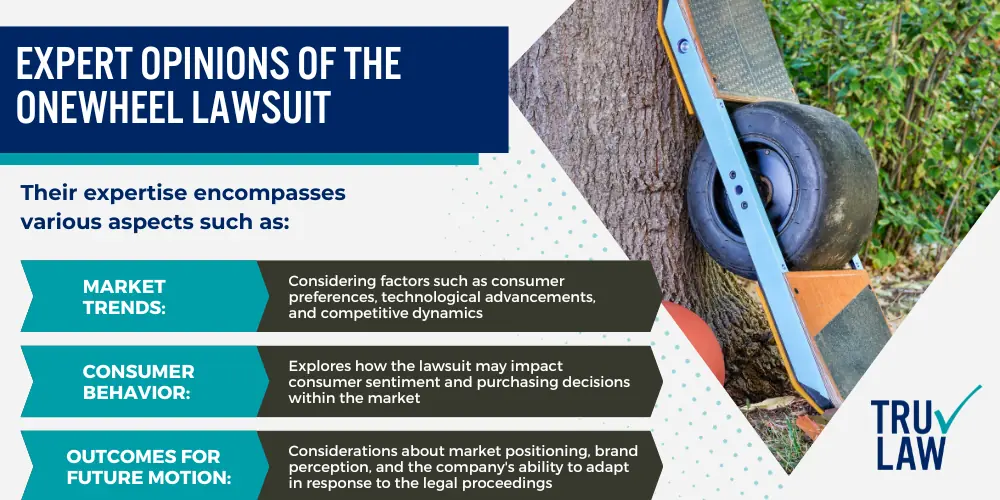
These experts bring to the table a wealth of knowledge and experience that enables them to offer profound insights into various facets of the lawsuit:
- Nature of the Claims: Legal experts have delved into the core nature of the claims made against Future Motion. They scrutinize the allegations, the legal grounds on which they are based, and the potential liability that the company may face.
- Legal Grounds: With their specialization in consumer protection and product liability, these experts analyze the laws and regulations that are central to the lawsuit. They identify the specific legal principles and precedents that may come into play, shedding light on the potential strengths and weaknesses of each party’s legal arguments.
- Implications for Future Motion: Legal experts provide perspectives on the potential consequences of the lawsuit for Future Motion. They consider scenarios that may arise, including settlement options, financial liabilities, and the impact on the company’s reputation within the industry.
By leveraging their deep expertise and experience in handling similar cases, these legal experts offer valuable insights that are indispensable for comprehending the legal complexities of the Future Motion lawsuit.
Their analyses serve as a beacon for individuals and entities seeking clarity amid the legal intricacies of the case.
Industry Analysts
In addition to the legal dimension, we have consider the insights of industry analysts who specialize in the electric personal transportation market.
These analysts bring a panoramic view of the lawsuit’s potential repercussions on the broader market landscape.
Their expertise encompasses various aspects:
- Market Trends: Industry analysts are attuned to prevailing market trends within the electric personal transportation sector.
- Consumer Behavior: These analysts explore how the lawsuit may impact consumer sentiment and purchasing decisions within the market.
- Outcomes for Future Motion: These analysts project the likely outcomes for Future Motion as a result of the lawsuit.
Drawing upon their extensive knowledge of market dynamics and their ability to forecast industry developments, industry analysts offer a comprehensive perspective on how the Future Motion lawsuit may resonate throughout the electric personal transportation market.
By incorporating the insights of both legal experts and industry analysts, our understanding of the multifaceted Future Motion lawsuit is enriched.
Whether your interest lies in the intricacies of the legal case or its broader implications for the electric personal transportation industry, the expert opinions provided here offer invaluable perspectives for a well-rounded comprehension of this significant legal matter.
TruLaw: Accepting Clients for Future Motion Onewheel Lawsuits
TruLaw’s network of Onewheel Electric Skateboard lawyers is accepting clients in all 50 states and filing Future Motion Onewheel lawsuits on behalf of those impacted by the defective electric skateboards.
You may qualify for an Onewheel lawsuit if you or a loved one have been injured as a result of Future Motion’s defective Onewheel electric skateboards.
Contact TruLaw for a free consultation or use the chatbot on this page to see if you qualify for legal action instantly.
Future Motion Onewheel Lawsuit Frequently Asked Questions
-
The Future Motion Onewheel Lawsuit alleges that Future Motion failed to adequately warn users about potential safety risks associated with the Onewheel device.
The lawsuit centers on claims that Future Motion, the manufacturer of Onewheel devices, did not provide sufficient warnings or safety information to users, potentially putting them at risk of serious injury while using the product.
This allegation raises questions about product liability claims and consumer safety.
-
The U.S. Consumer Product Safety Commission (CPSC) has issued warnings and a recall for the skateboards.
If you have been injured while using a Onewheel skateboard, it is important to report your injuries to the CPSC to help ensure consumer safety.
How to report injuries to Consumer Product Safety Commission (CPSC):
The CPSC is responsible for protecting the public from unreasonable risks of injury or death associated with consumer products. If you have been injured while using a Onewheel skateboard, you can report your injuries to the CPSC through the following steps:
- Visit the CPSC website: Go to the official website of the CPSC at www.cpsc.gov.
- Click on “Report an Unsafe Product”: Look for the “Report an Unsafe Product” link on the CPSC website and click on it.
- Provide details of the incident: Fill out the online form provided by the CPSC and provide detailed information about the incident, including the date, location, and nature of the injuries sustained while using the Onewheel skateboard.
- Submit the report: Once you have completed the form, submit it to the CPSC for review.
Reporting your injuries to the CPSC is important as it helps the agency gather information about potential product defects and take appropriate actions to protect consumers.
It is also advisable to consult with a personal injury attorney who specializes in product liability cases to understand your legal rights and options.
-
Yes, all models of Onewheel self-balancing electric skateboards are under recall after at least four (4) deaths and multiple injuries were reported in recent years, federal regulators announced.
The recall of all Onewheel models follows several reported deaths and numerous injuries associated with the use of these self-balancing electric skateboards.
Federal regulators have taken action to address safety concerns related to the product.
-
No, all of Future Motions electric Onewheel skateboards have been recalled.
For those who own the Onewheel GT, Onewheel XR, or Onewheel Pint, it has been advised that you should not download or update the Onewheel App following the voluntary recall.
-
The primary safety concerns when riding Onewheel skateboards include the risk of falling due to loss of balance, collisions with obstacles or vehicles, and the potential for equipment malfunction.
Given the serious risk, maintaining balance when operating these self-balancing electric skateboards is crucial.
Loss of balance poses a significant risk of throwing riders off the board, leading to potential injuries or fatalities.
While the Onewheel skateboards offer a unique riding experience, they come with significant safety concerns.
-
Yes, there have been several class action lawsuits against Future Motion Inc.
A class action lawsuit was filed in 2018 against Future Motion for their dangerous and defective Onewheel devices.
Currently, individual lawsuits are being filed for similar reasons — these lawsuits are different than the Class Action lawsuit. We are currently accepting clients for these lawsuits.
2023 Future Motion Onewheel Lawsuits
After announcing a recall of its Onewheel electric skateboard, Future Motion is facing approximately thirty five (35) lawsuits in federal courts and over one hundred (100) lawsuits in California state courts.
These lawsuits allege various design defects and injuries caused by the Onewheel skateboard.
These lawsuits allege that a feature known as “pushback,” designed to warn riders of excessive speeds, battery depletion, or nearing battery depletion.
This can cause the device to stop suddenly and nosedive, causing the rider to slam forward.
November 2021 Onewheel Lawsuit Filed Against Future Motion
For instance, a lawsuit was filed by Jason Ibarra, a rider dismounted in November 2021, alleging that his Onewheel stopped suddenly, causing him to require medical treatment.
Future Motion has attempted to consolidate these claims into multidistrict litigation over the ejection hazard.
-
If you’ve experienced injuries or an accident due to the malfunction of a Onewheel skateboard, you may be eligible to file a claim following the voluntary recall of over 300,000 skateboards linked to 4 deaths.
Contact Trulaw today for a no-obligation consultation with our experienced legal team.
We’re here to help you seek the compensation you deserve.
Consulting a Law Firm:
The first step in understanding your legal options following a voluntary recall is to consult with an experienced attorney.
Our law firm offer a no-obligation consultation to discuss the specifics of your case and guide you through a free consultation.
Onewheel Lawsuit Legal Team Assessment:
Once you have consulted with a law firm, their legal team will conduct a free case review to evaluate the merits of your claim.
This involves gathering evidence, understanding the circumstances of your case, and determining the best course of action.
FDA Guidelines: Onewheel Lawsuit
Voluntary recalls are often initiated under specific guidelines set forth by regulatory agencies such as the FDA.

Managing Attorney & Owner
With over 25 years of legal experience, Jessica Paluch-Hoerman is an Illinois lawyer, a CPA, and a mother of three. She spent the first decade of her career working as an international tax attorney at Deloitte.
In 2009, Jessie co-founded her own law firm with her husband – which has scaled to over 30 employees since its conception.
In 2016, Jessie founded TruLaw, which allows her to collaborate with attorneys and legal experts across the United States on a daily basis. This hypervaluable network of experts is what enables her to share the most reliable, accurate, and up-to-date legal information with our readers!
Additional Future Motion Onewheel Lawsuit resources on our website:
Here, at TruLaw, we’re committed to helping victims get the justice they deserve.
Alongside our partner law firms, we have successfully collected over $3 Billion in verdicts and settlements on behalf of injured individuals.
Would you like our help?
At TruLaw, we fiercely combat corporations that endanger individuals’ well-being. If you’ve suffered injuries and believe these well-funded entities should be held accountable, we’re here for you.
With TruLaw, you gain access to successful and seasoned lawyers who maximize your chances of success. Our lawyers invest in you—they do not receive a dime until your lawsuit reaches a successful resolution!
AFFF Lawsuit claims are being filed against manufacturers of aqueous film-forming foam (AFFF), commonly used in firefighting.
Claims allege that companies such as 3M, DuPont, and Tyco Fire Products failed to adequately warn users about the potential dangers of AFFF exposure — including increased risks of various cancers and diseases.
Depo Provera Lawsuit claims are being filed by individuals who allege they developed meningioma (a type of brain tumor) after receiving Depo-Provera birth control injections.
A 2024 study found that women using Depo-Provera for at least 1 year are five times more likely to develop meningioma brain tumors compared to those not using the drug.
Suboxone Tooth Decay Lawsuit claims are being filed against Indivior, the manufacturer of Suboxone, a medication used to treat opioid addiction.
Claims allege that Indivior failed to adequately warn users about the potential dangers of severe tooth decay and dental injuries associated with Suboxone’s sublingual film version.
Social Media Harm Lawsuits are being filed against social media companies for allegedly causing mental health issues in children and teens.
Claims allege that companies like Meta, Google, ByteDance, and Snap designed addictive platforms that led to anxiety, depression, and other mental health issues without adequately warning users or parents.
Transvaginal Mesh Lawsuits are being filed against manufacturers of transvaginal mesh products used to treat pelvic organ prolapse (POP) and stress urinary incontinence (SUI).
Claims allege that companies like Ethicon, C.R. Bard, and Boston Scientific failed to adequately warn about potential dangers — including erosion, pain, and infection.
Bair Hugger Warming Blanket Lawsuits involve claims against 3M — alleging their surgical warming blankets caused severe infections and complications (particularly in hip and knee replacement surgeries).
Plaintiffs claim 3M failed to warn about potential risks — despite knowing about increased risk of deep joint infections since 2011.
Baby Formula NEC Lawsuit claims are being filed against manufacturers of cow’s milk-based baby formula products.
Claims allege that companies like Abbott Laboratories (Similac) and Mead Johnson & Company (Enfamil) failed to warn about the increased risk of necrotizing enterocolitis (NEC) in premature infants.
Here, at TruLaw, we’re committed to helping victims get the justice they deserve.
Alongside our partner law firms, we have successfully collected over $3 Billion in verdicts and settlements on behalf of injured individuals.
Would you like our help?
